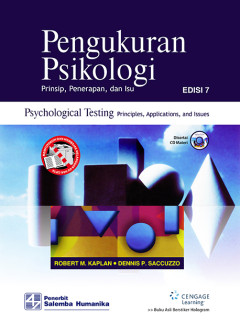Ditapis dengan

Building a Web-Based Education System. E-JURNAL
Information technologies used in the workplace, such as videoconferencing and the Internet, have become available to educational institutions as well. When used for distance learning, these technologies can make education more widely available by breaking geographic and time boundaries. But like television and computing before it, distance learning may demand new instructional approaches. Takin…
- Edisi
- Vol. 45, Issue 3
- ISBN/ISSN
- 0049-3155
- Deskripsi Fisik
- -
- Judul Seri
- -
- No. Panggil
- -

The Bell Curve: another chapter in the continuing political economy of racism…
As a critique of The Bell Curve, this article briefly explores ideas about intelligence, "race," and the relationship of those ideas to the place of Blacks in America's political economy. The analysis examines the role of intellectuals in their respective periods in shaping knowledge about intelligence and race. The eugenics movement, including its leaders, and the relationship of their ideas t…
- Edisi
- Vol. 39, Issue 1
- ISBN/ISSN
- 0002-7642
- Deskripsi Fisik
- 8 hlm
- Judul Seri
- -
- No. Panggil
- -

Social justice and the global economy: new challenges for social work in the …
The globalization of the economy creates new challenges for social work in the arenas of social and economic justice. This article outlines social justice issues related to the debt crisis of the Global South and sweatshops. A presentation of colonial precursors is followed by a detailed examination of these global institutions with an emphasis on the vulnerability, disempowered status, and exp…
- Edisi
- Vol. 49, Issue 2
- ISBN/ISSN
- 0037-8046
- Deskripsi Fisik
- 281-290 hlm ; 10 lembar
- Judul Seri
- -
- No. Panggil
- -

Library Management: It's Not Rocket Science.
Ozan Varol's book, Think Like a Rock Scientist, contends that you can "make giant leaps in work and life" by following his guidance. The rocket scientist, however, has a much easier task than a library manager because rockets follow the laws of gravity while managers must deal with the messy problems of irrational humans. Effective communication is difficult to achieve. Cognitive dissonance and…
- Edisi
- -
- ISBN/ISSN
- 0193-0826
- Deskripsi Fisik
- -
- Judul Seri
- -
- No. Panggil
- 025.1 HOL l

Applied Intelligence : Kecerdasan Terapan
- Edisi
- Cet. 1.--
- ISBN/ISSN
- 978-602-9033-66-3
- Deskripsi Fisik
- vii, 590 hlm
- Judul Seri
- -
- No. Panggil
- 153.9 ROB a
- Edisi
- Cet. 1.--
- ISBN/ISSN
- 978-602-9033-66-3
- Deskripsi Fisik
- vii, 590 hlm
- Judul Seri
- -
- No. Panggil
- 153.9 ROB a

Pengukuran Psikologi: Prinsip, Penerapan dan Isu
- Edisi
- Ed. 7
- ISBN/ISSN
- 978-981-4410-33-5
- Deskripsi Fisik
- xxi, 704 hlm.; 28 cm
- Judul Seri
- -
- No. Panggil
- 100 ROB p
- Edisi
- Ed. 7
- ISBN/ISSN
- 978-981-4410-33-5
- Deskripsi Fisik
- xxi, 704 hlm.; 28 cm
- Judul Seri
- -
- No. Panggil
- 100 ROB p

Teknologi Sediaan: Liquida dan Semisolida
- Edisi
- -
- ISBN/ISSN
- 978-602-271-036-3
- Deskripsi Fisik
- v, 106 hlm.; 23 cm.
- Judul Seri
- -
- No. Panggil
- 615 ROB t
- Edisi
- -
- ISBN/ISSN
- 978-602-271-036-3
- Deskripsi Fisik
- v, 106 hlm.; 23 cm.
- Judul Seri
- -
- No. Panggil
- 615 ROB t

Teori Kriminologi: Konteks dan Konsekuensi
- Edisi
- Cet. 1.--
- ISBN/ISSN
- 978-602-1186-68-8
- Deskripsi Fisik
- xviii, 564 hlm.; 24 cm
- Judul Seri
- -
- No. Panggil
- 364 ROB t
- Edisi
- Cet. 1.--
- ISBN/ISSN
- 978-602-1186-68-8
- Deskripsi Fisik
- xviii, 564 hlm.; 24 cm
- Judul Seri
- -
- No. Panggil
- 364 ROB t

Kajian Undang-Undang Sumber Daya Air
- Edisi
- Ed. 1
- ISBN/ISSN
- 979-731-617-3
- Deskripsi Fisik
- xvi, 240 hlm.; 23 cm
- Judul Seri
- -
- No. Panggil
- 343.09 ROB k
- Edisi
- Ed. 1
- ISBN/ISSN
- 979-731-617-3
- Deskripsi Fisik
- xvi, 240 hlm.; 23 cm
- Judul Seri
- -
- No. Panggil
- 343.09 ROB k

Islam Pasar Keadilan: Artikulasi Lokal, Kapitalisme dan Demokrasi
- Edisi
- Cet. 2.--
- ISBN/ISSN
- 979-8966-79-1
- Deskripsi Fisik
- xxviii, 330 hlm.; 21 cm.
- Judul Seri
- -
- No. Panggil
- 297.272 ROB i
- Edisi
- Cet. 2.--
- ISBN/ISSN
- 979-8966-79-1
- Deskripsi Fisik
- xxviii, 330 hlm.; 21 cm.
- Judul Seri
- -
- No. Panggil
- 297.272 ROB i
 Karya Umum
Karya Umum  Filsafat
Filsafat  Agama
Agama  Ilmu-ilmu Sosial
Ilmu-ilmu Sosial  Bahasa
Bahasa  Ilmu-ilmu Murni
Ilmu-ilmu Murni  Ilmu-ilmu Terapan
Ilmu-ilmu Terapan  Kesenian, Hiburan, dan Olahraga
Kesenian, Hiburan, dan Olahraga  Kesusastraan
Kesusastraan  Geografi dan Sejarah
Geografi dan Sejarah